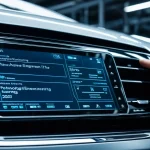Technological Advancements Shaping UK Automotive Innovation
The UK automotive industry is at the forefront of revolutionary shifts driven by cutting-edge automotive technology. A key trend is the rapid enhancement of electric vehicle (EV) technology, supported by robust infrastructure development. Advances in battery efficiency and charging networks are making EVs increasingly practical for everyday use, catalyzing the industry’s transition towards sustainable transport.
Autonomous and connected vehicle systems form another cornerstone of innovation trends in the UK. These systems use sophisticated sensors, AI algorithms, and vehicle-to-everything (V2X) communication to improve safety and traffic management. UK firms are heavily investing in these technologies, propelling the nation towards a future where self-driving and networked cars become the norm.
Also read : How Are Technological Advancements Influencing The Future of UK Automotive Engineering?
Digitalisation is revolutionizing manufacturing within the sector. Smart factories leverage IoT devices and machine learning to optimize production lines, reducing waste and increasing output precision. These innovations enhance efficiency and enable faster iteration cycles, thereby making the UK automotive landscape more competitive globally.
Together, these advancements illustrate the UK’s commitment to evolving automotive technology through integrated innovation across vehicle design, infrastructure, and production methods.
Also read : How Will Automation Transform the Future of the UK Automotive Industry?
Sustainability and Environmental Impact in Automotive Evolution
Sustainability is becoming central to green automotive developments in the UK automotive industry, reflecting a broader commitment to sustainable mobility. The adoption of eco-friendly materials, such as recycled composites and bio-based plastics, is transforming vehicle design. These materials reduce reliance on fossil fuels and lower the carbon footprint throughout a vehicle’s lifecycle.
In manufacturing, companies increasingly implement green processes, including energy-efficient production and waste minimization. This shift aligns with circular economy principles, where reuse and recycling shorten the supply chain’s environmental impact. Such strategies directly contribute to emissions reduction targets set by the government and international agreements.
Hydrogen fuel and other alternative energy solutions are gaining momentum across the UK. Hydrogen-powered vehicles offer a zero-emission alternative to battery-electric cars, especially for heavy transport sectors. Expansion of hydrogen refuelling infrastructure supports this transition, incentivizing adoption and broadening the scope of sustainable mobility.
By combining material innovation, cleaner production methods, and diversified energy sources, the UK automotive industry is addressing pressing environmental challenges. These efforts highlight how innovation trends intertwine with sustainability goals to drive the future of mobility towards a greener, more responsible path.









